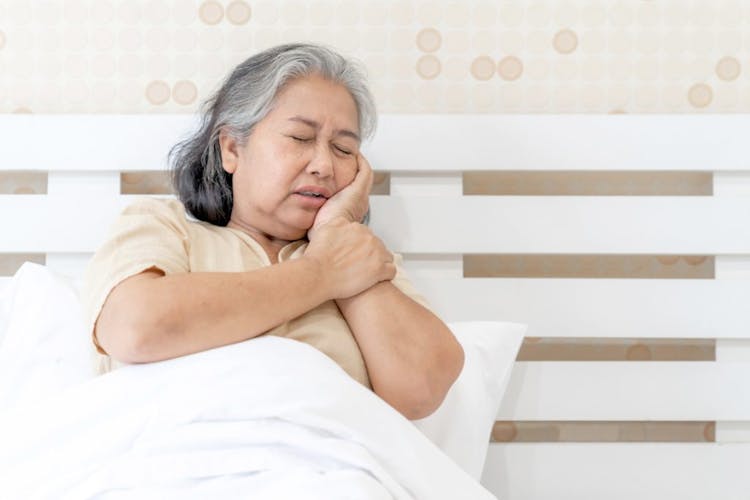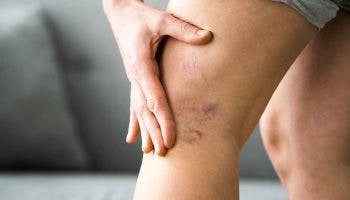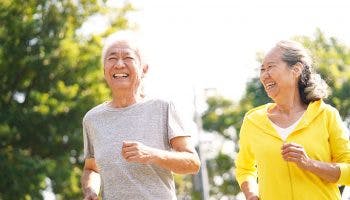Tips to Healthy Ageing in Your 40s and Beyond
Published | 8 min read
Ageing is a natural process in life. Find out what to expect and tips to age healthily as you enter each new decade in your life beyond 40.

Ageing is more than just grey hairs and counting years of living. It is a natural process of getting older as we start to experience many physical, mental, physiological, and social changes.
Ageing in your 40s
While most of us seem to appear healthy on the outside and still look youthful, here comes our body hitting us with a few of the first signs of ageing.
Slow metabolism rate
Your metabolism might be declining much faster due to a couple of factors.
- Chronic stress: A rise in your stress hormone (cortisol) switches your body to fight-or-flight mode that temporarily suppresses bodily functions, including your metabolism.
- Sarcopenia: A normal ageing process where we naturally lose muscles as we get older. This means we are not as physically fit as before, indicating that our metabolism is also dropping.
Weight gain and obesity
A slow metabolism rate will make it harder to lose weight. With poor eating habits and a lack of exercise, you are taking in more calories without burning them out for energy. Over time, these calories will accumulate inside your body as fats and increase your cholesterol levels.
Obesity can lead to many serious complications, mainly cardiovascular diseases, diabetes, and high blood pressure.
Skin ageing
Wrinkles and fine lines start to appear more visible as our skin becomes saggy due to a lack of production of collagen and elastin, two proteins important for maintaining skin elasticity. As a lesser amount of sebum (oil) is produced, the ability to retain moisture also diminishes, leaving us with a drier and coarse skin surface.
Long exposure to the sun or ultraviolet (UV) rays can cause changes in pigment cells (melanin), causing age spots to appear.

Ageing in your 50s
Body aches, sores and fatigue begin to creep in as you enter your 50s due to several reasons.
Menopause and andropause
Women in their 50s undergo a drastic drop in levels of reproductive hormones, whereby you no longer have menstrual periods for 12 months straight—marking the end of menstruation. While this life-changing phase sounds like a relief, the transition period before menopause brings a long list of discomforts such as hot flashes, night sweats, sleeping troubles, weight gain, and mood swings.
For some men in their 50s, their male hormones (testosterone) begin to decline very slowly from this age. Different from menopause, andropause does not cause infertility nor does it affect all men.
Reduced bone density
One of the effects of menopause is decreasing level of oestrogen, a hormone that functions to support growth and maintain bone structure. The lesser amount of oestrogen results in low bone density, whereby your bones become thinner, brittle, and weaker.
Hence, women are more vulnerable to fractures or bone diseases like osteoporosis, compared to men.
Wear and tear of joints
Entering the 50s, we start to lose joint fluid, resulting in our joints becoming stiff due to more friction between the bones.
Not only that, the soft tissues in between the bones known as cartilage pads also gradually wear off, reducing the gaps in your joints that may lead to a stooped posture (like hunching). Hence why you may notice your height shrink as you get older.
Age-related eye diseases
Apart from manageable eye problems like dry eyes and reduced eyesight, ageing also causes major eye disorders. Cataracts, glaucoma, age-related macular degeneration (AMD), and diabetic retinopathy are some of the most common ageing-related eye diseases.
Increasing risks of cancers
Incidence rates of cancer cases begin to rise to start the age of 50s. By detecting early signs and warnings, your doctor can advise immediate treatments as prevention.

Ageing in your 60s and beyond
Quality of life in the 60s and older are greatly affected by a myriad of health concerns. Most of the complications at this age are long-term and can be life-threatening.
Frailty
Frailty is a common ageing-related health condition characterised by:
- low physical energy and strength;
- incontinence;
- slow mobility and reflexes.
Declining ability to hold onto things more firmly and struggle to balance our body well increase the risk of falling, especially in the bathroom. Such inconvenience may pose fear of moving around, which further discourages a person at this age from being active and taking care of personal hygiene. Hence, long-term care is essential to provide assistance with these activities of daily living.
Cognitive ageing and impairment
Normal cognitive ageing (NCA) can affect how you process information, retrieve old memories, and cause distractions due to ageing.
Dementia, albeit common among older adults, is not age-related. It is a syndrome that interferes with the neural pathway in the brain, preventing the cells from communicating properly with each other. The most prevalent type of dementia Is Alzheimer’s. Symptoms are more severe than NCA, to the point of affecting behaviours, mood and independence.
Mental disorders
In 2009, about 13.9% of older Malaysians were reported suffering from depression, but the number of cases has increased significantly since then. Going through physical and cognitive ageing can leave them feeling helpless as well as isolated, which contributes to a sense of loneliness.
Other mental illnesses often associated with ageing are anxiety, schizophrenia, and psychosis.
Sleep problems
Ageing messes up your sleep cycle wherein you wake up ahead of time despite going to bed early the night before—a syndrome called Advanced Sleep Phase Disorder.
Apart from that, your sleep quality at night is also disturbed by various factors including:
- Long daytime napping
- Frequent night urination (nocturia)
- Muscle cramps or joint pains
- Medication side effects
- Sleep discomforts such as sleep apnea
- Anxiety
Hearing loss
Structural changes in the inner ears and impaired nerves from the inner ears to the brain (auditory nerve) are usually the main causes of presbycusis, where we slowly lose our sense of hearing.
Hearing loss cannot be cured, but there are ways to improve hearing through the use of hearing aids (for mild to moderate loss) and cochlear implants (for severe loss).
Dental and oral problems
A common age-related oral problem is receding gums. Bits of food can get trapped within the exposed gaps, attracting bacterial growth which develops tooth decay. Having fewer teeth makes chewing a struggle that can kill your appetite, thus we see many seniors suffer from poor diet.
Your sense of taste grows faint as well, due to taste bud cells no longer reproducing as quickly. You may notice that adults in their later years tend to crave anything sweet as foods taste bland.

Ways to healthy ageing
Ageing presents many health warnings to look out for, but the key is to start young. These tips are simple but crucial in ensuring a more thriving and potentially longer life.
- Stay physically active to put the muscles to work. Ensure there are always bodily movements each day, be it through exercising, walking, or gardening.
- Stimulate your mind by having hobbies like reading newspapers and doing crossword puzzles. Apart from reducing stress, actively using your brain is important to avoid ‘rusting’ of memory and thinking ability.
- Engage in conversations. Being social helps to reduce feelings of loneliness and lift up your mood. If you are a caregiver, talking to them daily can encourage communication and self-confidence.
- Stay hydrated and eat a balanced diet. A lack of vitamins, nutrients, and water can cause tiredness. Stay away from high-sugar and high-sodium meals. Instead, top up on leafy greens, fibre, and calcium to keep your body weight in check. Alcohol consumption should be reduced to none.
- Establish a hygiene routine. Brush your teeth daily using a soft toothbrush and shower twice a day. Visit the dentist for dental check-ups as well as to make sure your dentures are well fit.
- Stick to your sleep schedule. Try to avoid long nap times during the day and go to bed at regular hours. You can also do plenty of activities in the evening so that you will sleep easier at night.
- Say no to smoking. Not only does it lead to heart diseases and lung cancer, but the chemicals can also impair your brain too. Smoking worsens wrinkles, which can make you appear older fast.
- Protect your skin with a good skincare regime. Apply sunscreen daily even when you are indoors.
- Do not skip doctor appointments to check your health progress, particularly high blood pressure, cholesterol and sugar levels. This is when you inform the healthcare provider of any abnormalities to reduce potential health risks in the future.
- Go for eye checkups and ear examinations once you start to notice changes in your eyesight and hearing. Blurry vision can increase the risk of falling while hearing loss prevents you from being alert to your surroundings.
This article is an adaptation of Ageing: What to Expect in your 40s, 50s, 60s and Beyond from Homage.my.
Are you looking for someone to care for your loved ones?
Homage is a personal healthcare solution that connects caregivers, nurses and therapists with seniors who need on-demand holistic home care in their homes, allowing them to recover and age with grace, control and dignity.
References
- Age UK. (2022, April 28). 10 tips for ageing better. https://www.ageuk.org.uk/information-advice/health-wellbeing/mind-body/10-tips-for-ageing-better/
- Batumalai, K. (2020, November 18). The invisible mental health issues of older Malaysians. Code Blue. https://codeblue.galencentre.org/2020/11/18/the-invisible-mental-health-issues-of-older-malaysians/
- Brown, J. (2018, Feb 1). Your healthiest you 40, 50, 60, and 70+. Prevention. https://www.prevention.com/health/a20516160/your-healthiest-you-40-50-60-and-70/
- Business Insider. (2018, Dec 29). Here are some of the common diseases to look out for each decade after 40, and how to reduce your risk of getting them. https://www.businessinsider.com/diseases-to-look-out-for-in-your-40s-50s-60s-and-beyond-2018-12
- Centres for Disease Control and Prevention. (2021, March 31). Osteoporosis or low bone mass in older adults: United States, 2017–2018. https://www.cdc.gov/nchs/products/databriefs/db405.htm
- Clason, D. (2022, April 19). Age-related hearing loss. Healthy Hearing. https://www.healthyhearing.com/report/52510-Presbycusis-understanding-age-related-hearing-loss
- Department of Statistics Malaysia. (2021, July 29). Abridged life tables, Malaysia, 2019-2021. https://www.dosm.gov.my/v1/index.php?r=column/cthemeByCat&cat=116&bul_id=aHNjSzZadnQ5VHBIeFRiN2dIdnlEQT09&menu_id=L0pheU43NWJwRWVSZklWdzQ4TlhUUT09
- Elan Healthcare. (2022, May 24). What is the difference between andropause and menopause? https://elanhealthcare.ca/blogs/health-blog/what-is-the-difference-between-andropause-and-menopause
- International Agency for Research on Cancer. (n.d.). Estimated number of new cases in 2020, worldwide, both sexes, ages 65+. https://gco.iarc.fr/today/online-analysis-table?v=2020&mode=cancer&mode_population=continents&population=900&populations=900&key=asr&sex=0&cancer=39&type=0&statistic=5&prevalence=0&population_group=0&ages_group%5B%5D=13&ages_group%5B%5D=17&group_cancer=1&include_nmsc=1&include_nmsc_other=1
- Keck Medicine of USC. Your body at 40, 50, 60 and 70. (2019, August 12). https://www.keckmedicine.org/blog/your-body-at-40-50-60-and-70/
- National Cancer Institute. (2021, March 5). Age and cancer risk. https://www.cancer.gov/about-cancer/causes-prevention/risk/age
- Yurcaba, J. (2019, April 11). The most common health concerns in your 20s, 30s, and beyond. Woman’s Day. https://www.womansday.com/health-fitness/womens-health/g27101631/health-issues-by-age/?slide=4
Share this article on






